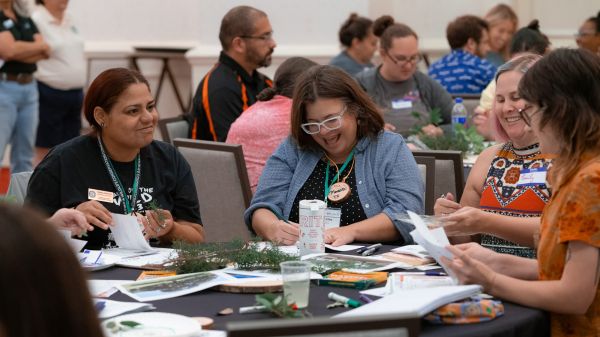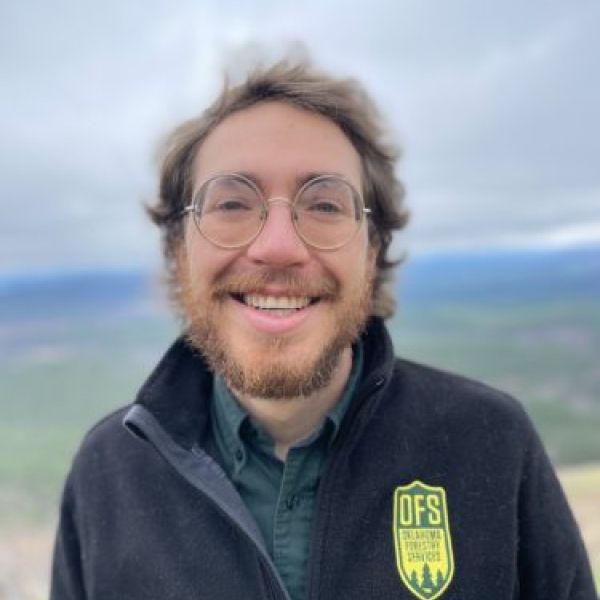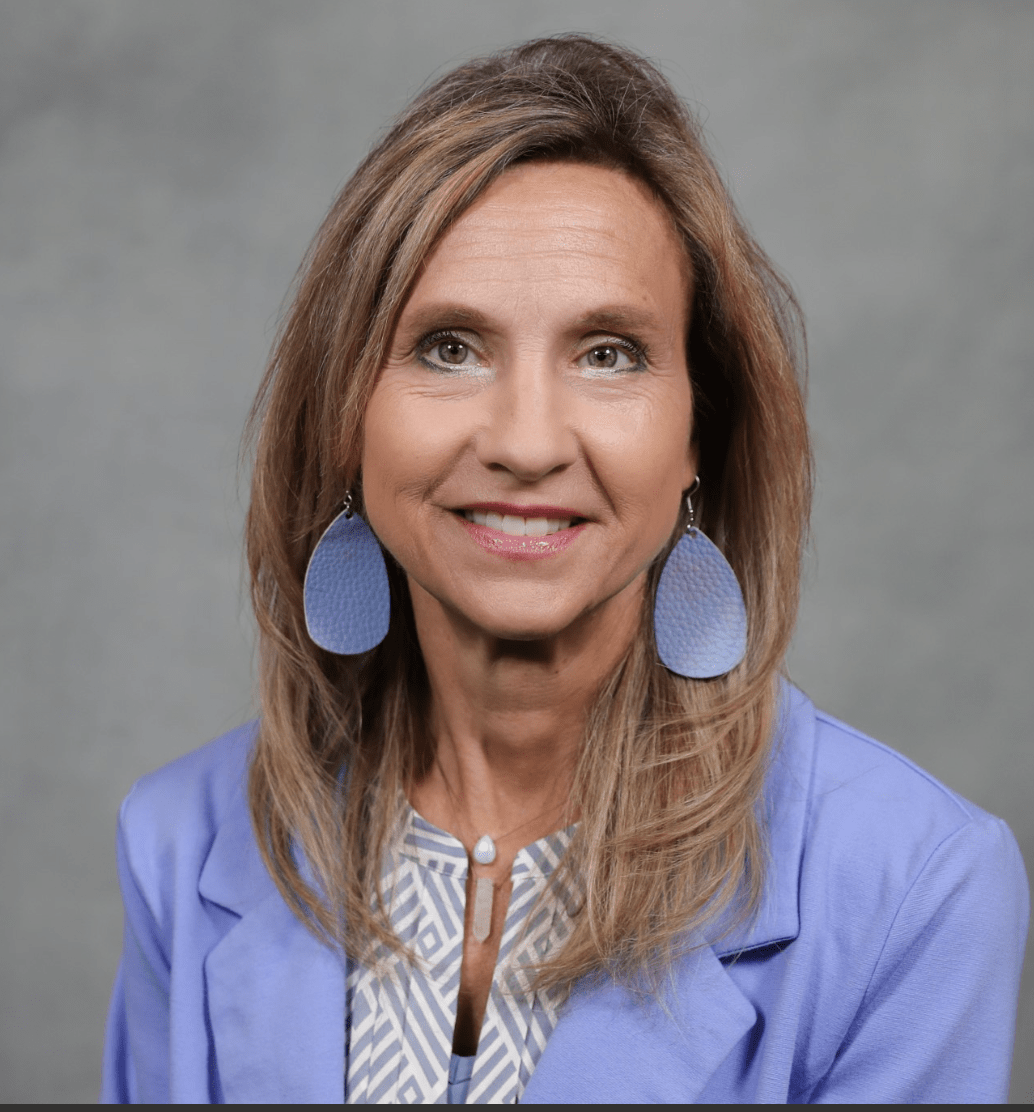Creating a Welcoming Learning Environment for Educators

Photo credit: Megan Annis, Sustainable Forestry Initiative/Project Learning Tree (PLT)
The ee360+ initiative brings together various partners to build an environmentally literate and engaged public that is building resilient communities and a healthier, more sustainable and equitable future for all. As a longtime training partner on the ee360+ initiative, Project Learning Tree (PLT) focuses on providing training and long-term support to diverse formal and nonformal environmental education leaders. PLT is a community of people passionate about educating the next generation about environmental issues and encouraging learners to think critically and dream big. Below are stories of two such EE leaders who are engaging with educators in their communities to bring nature-based learning to more students.
Tony Pascall, Oklahoma PLT State Coordinator
“The environmental education community is very welcoming, and I love how much everyone reaches out to help one another. I’ve been able to work with several different organizations to put on shared educator workshops and student events, and I meet new people and learn something new every time.”
Before becoming a PLT state coordinator three years ago, Tony Pascall taught middle school math and STEM in Title 1 schools in Detroit and Dallas for several years. After graduating with a degree in ecology from North Carolina State, he joined Teach for America with the intention of going back to become a plant biologist.

Tony Pascall, Oklahoma PLT State Coordinator
But instead, he caught a bug—the teaching bug—and fell in love with it. “The entire time I worked to incorporate my love of nature and the outdoors into my teaching. I brought my students outdoors for math labs, and even had an outdoor adventure club, where I brought some students hiking and camping! Most of my favorite moments in my formal teaching career come from this club, where I got to watch students fall in love with—and ultimately learn to conserve—their environment.”
Tony’s favorite thing about professional development events is “meeting cool educators! I love seeing what other folks are up to and how they already incorporate nature education into their teaching, and showing off PLT’s awesome standards-aligned activities. We always generate great ideas to adapt activities for different folks, and there is an awesome spirit of collaboration at PD events.”
He shared some great advice at a workshop earlier this year with a group of middle school teachers: “You can’t teach awe and appreciation for nature, but you can give space for it.” The teachers put this phrase on their forestry camp t-shirts this year!
Tony continued, “I think PLT can help teachers build in more time for helping students understand the world around them in their classes. My advice is to slow down and let there be time to notice.”
Back in Tony’s classroom days, he loved using the outdoors as a way to get students more interested in the material he was teaching. Tony said, “When I taught 7th grade math, I used to say, ‘You can draw a graph about anything!’ I chose to teach outdoors and about our environment because my students were usually more engaged and more curious when learning about the natural world.”
If you’re able to take your students outdoors safely, start small and try one lesson outside. See how things go and as you become more comfortable, increase outdoor time to once a month or once a week. Tony shared, “I believe everyone deserves to understand and love their place. I think that once you get kids looking closely at what is right outside their door, they quickly get curious and start asking questions and making connections.”
Dena Harshbarger, Ph.D., PLT Facilitator & Professor at University of Nebraska, Kearney, College of Education
Before she began fostering the next generation of teachers, Dena Harshbarger, Ph.D., spent 18 years in the classroom as a 4th- and 6th-grade teacher. Today, Dena is a professor at the University of Nebraska, Kearney (UNK), where she teaches elementary education methods courses to preservice teachers. She loves sharing her passion for teaching and classroom experience with her students.
In 2022, Dena became a PLT facilitator after Jack Hilgert, Nebraska PLT state coordinator, reached out to her about offering a workshop for her elementary science methods students. “I was trained in Project WILD and Project WET when I was an undergraduate student at UNK in 1992. As a result, I have always been an advocate for environmental education and using the outdoors as an extension of the classroom.”

Dena Harshbarger, Ph.D., PLT Facilitator & Professor at University of Nebraska, Kearney, College of Education
Incorporating PLT into her preservice coursework was a natural fit. “I strive to find ways to create inquiry-based learning opportunities in which students can discover and ponder the world around us," said Dena Harshbarger.
"PLT perfectly aligns with my focus on constructivism and experiential learning. I enjoy getting UNK preservice teachers excited about using PLT in their future classroom.” In fact, Dena’s favorite days are when she sees her preservice students teach elementary students during their field experiences. It brings her back to her classroom days and fills her with pride seeing these future teachers in action. “It’s a full circle moment for me,” she says.
“Today, many children spend less time outdoors and have a more sedentary lifestyle. My goal for elementary and UNK students alike is to gain background knowledge through experiential learning, so they are informed citizens. PLT provides opportunities in which Pre-K–12 students can explore the world around them and develop an appreciation of nature.” By training future teachers how to use PLT, Dena hopes that when they do enter the classroom, they’ll feel comfortable using nature as a tool to teach about multiple subjects, know how to create safe spaces to teach outdoors, and be more inclined to use PLT in their lessons.
This eePRO blog series, Ripple Effect, highlights stories of collaboration and impact among partners in the ee360+ Leadership and Training Collaborative. ee360+ is an ambitious multi-year initiative that connects, trains, and promotes innovative leaders dedicated to using the power of education to create a more healthy and sustainable future for everyone, everywhere. Led by NAAEE, ee360+ is made possible through funding and support from U.S. EPA and twenty-five partner organizations representing universities and nonprofits across the country, as well as five federal agencies. Through this partnership, ee360+ brings together more than five decades of expertise to grow and strengthen the environmental education field.

